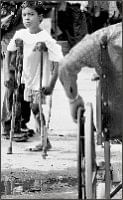Human Rights advocacy
Equality for the disabled
Mohammad Shahidul Islam
 December 3rd was the International Day of Disabled Persons. This year the theme of the day was "Decent work for Persons with Disabilities." Bangladesh has signed and ratified this convention recently. Now more commonly called differently-abled persons or persons with disabilities, the world is yet to see equality being granted to this substantial segment of the population. The theme of the Day is based on the goal of full and equal enjoyment of human rights and participation in society by persons with disabilities, established by the World Programme of Action Concerning Disabled Persons, adopted by the UN General Assembly in 1982.
December 3rd was the International Day of Disabled Persons. This year the theme of the day was "Decent work for Persons with Disabilities." Bangladesh has signed and ratified this convention recently. Now more commonly called differently-abled persons or persons with disabilities, the world is yet to see equality being granted to this substantial segment of the population. The theme of the Day is based on the goal of full and equal enjoyment of human rights and participation in society by persons with disabilities, established by the World Programme of Action Concerning Disabled Persons, adopted by the UN General Assembly in 1982.
One of the most pressing needs for the disabled is accessibility. They have every right to gain access to facilities enjoyed by able-bodied persons, but there are many modern buildings in Bangladesh and elsewhere that have not taken the disabled into account at the design stage.
Accessibility can mean simple things, not grandiose designs. Ramps and lifts instead of stairs, railings, specially designed washrooms, visual guides for the deaf and audio signals for the visually impaired are just a few of these.
In some countries, currency notes have tactile features that help the blind identify the monetary value. Subtitles on films and teledramas help the deaf to appreciate and enjoy those creations.
Bangladesh does have an impressive healthcare and education record envied even by many developed countries. But Bangladesh does lag behind the West and even some developing countries as far as accessibility for the disabled is concerned. All political parties should have supported an initiative to ensure that accessibility laws would be strictly implemented soon or later.
We hope the authorities will succeed in this endeavour. Thereafter, no new buildings and structures should be approved if there is no provision for the disabled and even older buildings should be urged to retro-fit disabled-friendly facilities where possible.
Disability is caused by many factors. Some disabilities are birth defects, but most other disabilities are caused later in life by disease, accidents (at work or on highways) and the conflicts witnessed in many countries. But many of these disabilities can be prevented.
For example, diabetes, if untreated, can lead to blindness and/or the amputation of a leg. Road accidents too can be prevented if all drivers and road users including pedestrians observe road rules and act with discipline. Simple practices such as clearing mosquito breeding grounds can eradicate diseases such as filaria.
Nor should disabilities be thought of as permanent in this modern world. The latest artificial limbs are only second to the real thing. A Cochlear implant is virtually an inner ear that helps those with auditory difficulties to experience a whole new life.
But the most interesting development is the fusion of the mechanical aids with the body's own biological sensors - cameras that link up with the optic nerve may one day help the blind to literally see the world in a new light.
The latest advances in medicine can prevent and even cure many disabilities caused by disease. The adaptation of ordinary devices to make them disabled-friendly is another aspect - cars can be tailored to be driven by persons with disabilities.
In the meantime, we must do everything possible for the uplift of the disabled and to make them feel at home in an abled persons' world.
It is in this context that the UN should be commended for addressing discrimination against the disabled in the sphere of employment. UN Secretary-General Ban Ki-moon has stressed on the goal of decent work for persons with disabilities.
The crux of his argument is that every person deserves opportunities for productive employment in conditions of freedom, equity, security and human dignity.
It would indeed be a pity if a differently-abled person is denied some form of employment even when he or she possess the required qualifications and the capability to discharge the required duties despite the handicap.
The truth is that persons with disabilities are deprived of adequate employment opportunities in nearly every society. According to the UN, at least half of all disabled people in developed nations, and the vast majority of those with disabilities in developing countries, are unemployed. Most others are underemployed, or will never have full access to the labour market.
It is a vicious cycle. They encounter difficulties gaining access to an education or acquisition of employable skills. Later on, fears and prejudices about their abilities deny them the work opportunities available to others. This bleak picture should be changed to ensure justice to the disabled persons seeking work.
The best hope for the disabled in this regard is the Convention on the Rights of Persons with Disabilities, which is expected to enter into force early next year. It recognises the rights of persons with disabilities to work and employment on an equal basis with others.
The disabled need not beg for mercy and dignity. A dignified life for the disabled should no longer be a dream.
The writer is a human rights activist and freelance contributor.